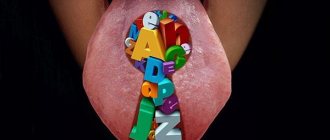- 19.04.2016
- Health, Articles, Explanatory
Not everyone perceives burr as a problem. For example, the French specifically learn this because they consider the drawn-out “r” to be a serious accent that adds romance to their language. In general, few peoples in the world use this sound in solid form. But there are a number of people for whom such a defect causes discomfort. Often those around us try to make fun of such a feature, and the world itself is so cruel that even in the word “burr” there is a letter “r”. If you are seriously thinking about how to stop burring, study all the information provided below, be patient and “it’s in the bag.”
What is burr?
Burr is a speech defect in which the pronunciation of the sound “r” is impaired. Or rather, it is distorted, replaced by other sounds, or absent altogether.
The most difficult words for burry people are words with the letter “r”:
Instead of “r”, a burry person pronounces the sounds “g” (kran-kgan), “d” (red-kdasny), “l” (steam locomotive), “y” (fish-yyba), “v” (steep- kvutoy), “y” (lynx-yys) or skips completely (ruka-uka).
And I must say, this does not have the best effect on the quality of life due to emotional discomfort.
Why is this happening? Why do people burr?
Why is clear speech so important?
In the early stages of growing up, a child needs a team, and due to a slight defect, the baby may feel like a stranger among his peers. Everything heats up in adolescence: many guys find burr funny, so they never miss the opportunity to somehow offend the poor guy. Finding himself in such a situation, a teenager forms new complexes that he may never get rid of.
Burr will affect an adult no less seriously. Yes, usually at this stage people stop openly throwing insults, but ridicule behind your back does not go away. A slight defect can seriously hamper career advancement. Some doors will remain closed altogether, since many professions are speech-demanding.
There is a misconception that problems with the letter “r” are solved exclusively in childhood. This is not entirely true. Defects can be “treated” at any time: even an elderly person can stop burring if they make an effort.
Causes of burr
Burr speech can have different reasons:
- Atypical structure of the oral cavity, for example, insufficient length of the frenulum, protruding lower jaw, inert tongue. This disrupts the functioning of the articulatory apparatus and the person burrs at the letter “r”.
- Organic hearing impairment. Hearing loss leads to underdevelopment of the motor side of speech and incorrect pronunciation.
- Heredity. There is an opinion that there is a high probability of inheriting such a defect from parents.
- Psychological. As a result of severe stress or an unforeseen situation, a malfunction of the body may occur and the pronunciation of certain sounds may change.
- Social. If parents do not pay attention to how the child speaks and do not take timely measures to correct speech impairment, burr can remain with him for a long time.
Why can't people pronounce "r"?
Problems with pronunciation can be caused by several factors, but there are only two main reasons:
- Articulatory. This problem is caused by incorrect articulation. When pronounced correctly, the sound “R” should be made with the tongue, not the throat. It is necessary to form your lips into a smile, opening your jaws. The tip of the tongue should be fixed behind the upper teeth. Now you need to try to make the sound “R”. It’s unlikely to work right away; it’s better to practice for a few minutes. If there is no result, there is a direct path to a speech therapist.
- Physiological. It occurs when there is a small frenulum under the tongue. The best solution would be to remove it. The operation is simple and is performed hundreds of times every day.
You can fight a physiological defect in another way. If a person is afraid to undergo surgery, it is worth trying to stretch the frenulum. This is not so simple and will take time, but such a measure will avoid “bloodshed.”
What to do if you burr?
A specialist who can really help cure burr and learn not to burr the letter “r” is a speech therapist. Professional knowledge is never superfluous. Moreover, rhotacism, also called burr, is a fairly common phenomenon among adults and children.
Proper sound production, working with the articulatory apparatus, speech therapy massage of the tongue, special exercises to correct burr - all this is in the arsenal of a professional specialist. And all this can give you back freedom in communication and pleasure from the sound of your own voice.
Seeing a speech therapist to unlearn how to burr is especially important for parents of children over 6 years old. Until this age, while the speech apparatus is developing, unclear pronunciation of the letter “r” is considered normal.
Correcting burr is also possible at home.
How to get rid of burr?
Unlike others, burry people always have the present, the future and... the vulgar. After reading and following the advice below, instead of the vulgar, only the past may remain. So you will need to attract additional vulgarity - other articles will help with this: how to find a girl, hidden sexual signals and how to hint to a girl about sex. So let's get started.
The most reasonable and effective method is treatment by a specialist - a speech therapist.
The easiest way to stop burring is for a teenager or child; just a few sessions can solve the problem. But don’t be upset if you are no longer at such a young age; it’s never too late to get rid of such a defect.
Another thing is whether you have the opportunity to see a doctor. Not everyone has the right amount of time or money, and some are simply ashamed, incorrectly believing that this is a purely children's specialist who has nothing to do with solving problems in adults.
In general, if going to a speech therapist is not an option for you at the moment, you can use a special set of exercises. By doing it regularly, it is quite possible to stop burring forever. In any case, such activities cannot cause harm, unless someone catches you doing such activities. From the outside it may seem quite strange, so we retire and begin to seriously “work”.
How to cure burr yourself
In order to remove burr, you should:
- learn deep breathing using the diaphragm;
- perform special exercises for burring, aimed at developing the muscles of the tongue and lips.
Breathing technique
If you observe yourself, you can see that breathing is most directly involved in the pronunciation of sounds. Try to pronounce the sound “p” without breathing - it turns out to be an empty slap with your lips. The sound “p” appears only on exhalation.
The same is with the sound “r” - the deeper the breath and the stronger the exhalation, the brighter the “rrrrrr” sounds.
Exercises to eliminate burr
You can fight the defect on your own in different ways. Everyone can choose an exercise to their liking. To achieve the fastest effect, it is recommended to do all of the following daily:
- Open your mouth as wide as possible. Tension should be felt in the jaw area. While in this position, you need to reach for the sky with your tongue. Now you need to fixate in this state for ten seconds.
- Ordinary tongue twisters, familiar to everyone from childhood. The ones that work best are those where the “r” sound is repeated frequently. You need to devote a few minutes a day to training.
- Gymnastic exercises for the tongue. He should become more mobile. You can move it as you like, it is best to try to reach the chin and the tip of the nose. You need to hold your tongue in this position for a few seconds.
- It is worth recording visible changes on a voice recorder every day and comparing notes after a week.
- Tongue twisters are not the only opportunity for practice. You can write down several words in which the “r” has a phonetic accent. For example, tractor, sentence, dragonfly, etc.
If after a couple of weeks there is no progress, it is better to consult a specialist. A professional speech therapist can easily correct an unpleasant defect and help the patient better understand his body.
Were you teased at school for mispronouncing "R"?
What is diction?
Diction is the correct pronunciation of sounds and words, which consists of clear and correct articulation and the ability to control timbre and intonation. Timbre refers to the speed and color of speech; it has been noted that people with poor diction tend to speak hastily. Intonation is the ability to distinguish vowel sounds and stress with the voice.
Articulation will be helped by special exercises, and to improve timbre and intonation it is necessary to do breathing exercises.
How to improve a child's diction?
According to the age norm of 5–6 years, a child should pronounce all sounds well. Alas, articulation itself does not become correct. You need to work on good diction, and the sooner you start working with your baby, the better. Where to begin?
Take care of yourself
A child learns to speak by imitating adults. If you yourself are bad at pronouncing sounds, then your baby will most likely also have problems with them. Listen to yourself, try to pronounce words clearly and correctly, practice problematic sounds. We'll talk about how to do this quickly below.
Do gymnastics
The muscles that are involved in the production of sounds also need training. Be sure to do articulation exercises with your child every day. These exercises should be performed in front of a mirror at first to make it easier to monitor the correct technique. To prevent your child from getting bored, give gymnastics a playful form.
Work on your breathing
Teach your baby to control his breathing. For example, there is a good exercise called “Candle”. Ask your child to imagine that he needs to blow out a big, big candle. Have him place his hands on his tummy, inhale, hold his breath for a second and blow on the flame. Did not work out? Try again together. Now you need to slightly “sway” the flame in different directions. Will it be possible to blow out a few candles? The game is quite simple, but effective, and there are several variations you can come up with. Does your child not like to blow out the candle? Let him imagine himself as a little dragon who needs to use the flame sparingly.
There are a lot of breathing exercises for preschoolers posted in the public domain. Don’t be lazy to find them and do them every day.
Tongue Twisters
These are wonderful and fun exercises that are time-tested and children really like them. We recommend starting with small tongue twisters of three or four words, and gradually move on to longer ones. First, learn how to pronounce them correctly yourself and only then teach your child.
The first time, speak the words slowly and clearly. A little faster the second time. Gradually increase the tempo until the child can pronounce the entire phrase clearly and quickly. Learn tongue twisters unobtrusively - while walking or swimming. You can also play with a ball: whoever throws the ball speaks. To avoid getting bored with your daily exercises, learn new tongue twisters. By the way, then you can arrange a competition: who knows them more and pronounces them better.
Seek help from a speech therapist
Classes must be carried out under the supervision of a specialist, because without special knowledge, using books alone, it is impossible to make sounds for a child correctly. On the contrary, you can achieve the completely opposite effect; correcting such errors is always more difficult. The speech therapist will identify problematic sounds for the baby, determine the causes of the difficulties and explain how to continue studying at home.










